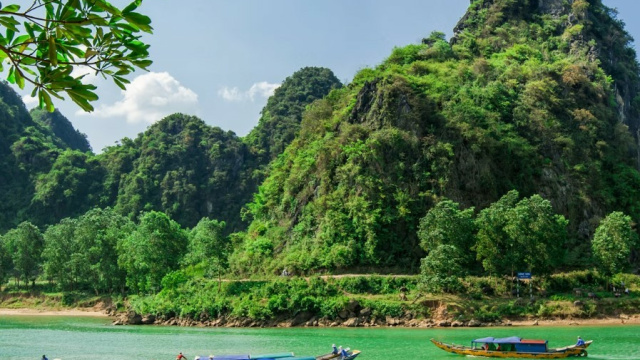Vietnam Aprilios

Dong Hoi
A city known for its beaches, historical attractions and access to Phong Nha-Ke Bang National Park.
Dong Hoi, in Quang Binh province, is a charming city in the north central region of Vietnam that combines historical significance, natural beauty and cultural richness. The city is known for its beaches, its proximity to the world-famous Phong Nha-Ke Bang National Park, and its preserved historical monuments.
Historical Heritage
With a history spanning centuries, Dong Hoi has preserved important monuments from different periods of its history. The city's old fort, built during the French colonial period, is one of the most impressive attractions, offering visitors a glimpse into the region's past. During the Vietnam War, the city suffered extensive damage, but many of its historic buildings have been restored, maintaining a connection to history.
Natural Beauty
Dong Hoi is famous for its quiet and unspoilt beaches, such as Nhat Le Beach, which offers golden sand, crystal clear waters and a tranquil atmosphere. The town is also the gateway to Phong Nha-Ke Bang National Park, a UNESCO World Heritage Site. The park is known for its impressive cave system, including Son Doong Cave, the largest cave in the world.
Cultural Experience
Dong Hoi's cultural heritage is highlighted through traditional Vietnamese cuisine, local markets and local traditions. Visitors can enjoy fresh seafood and local dishes that reflect the culinary diversity of the region.
Activities
Visitors to Dong Hoi can explore the historic city centre, relax on the beaches or visit the national park for a unique cave adventure. The area is ideal for those seeking a combination of tranquility, historical interest and natural wonders.
Dong Hoi is a destination that offers a complete experience, from historical discoveries to natural adventures, making it a great stop for any traveler.
Historical Heritage
With a history spanning centuries, Dong Hoi has preserved important monuments from different periods of its history. The city's old fort, built during the French colonial period, is one of the most impressive attractions, offering visitors a glimpse into the region's past. During the Vietnam War, the city suffered extensive damage, but many of its historic buildings have been restored, maintaining a connection to history.
Natural Beauty
Dong Hoi is famous for its quiet and unspoilt beaches, such as Nhat Le Beach, which offers golden sand, crystal clear waters and a tranquil atmosphere. The town is also the gateway to Phong Nha-Ke Bang National Park, a UNESCO World Heritage Site. The park is known for its impressive cave system, including Son Doong Cave, the largest cave in the world.
Cultural Experience
Dong Hoi's cultural heritage is highlighted through traditional Vietnamese cuisine, local markets and local traditions. Visitors can enjoy fresh seafood and local dishes that reflect the culinary diversity of the region.
Activities
Visitors to Dong Hoi can explore the historic city centre, relax on the beaches or visit the national park for a unique cave adventure. The area is ideal for those seeking a combination of tranquility, historical interest and natural wonders.
Dong Hoi is a destination that offers a complete experience, from historical discoveries to natural adventures, making it a great stop for any traveler.

Hanoi
The capital of the country, known for its rich history and cultural heritage.

Ha Long Bay
This majestic geological wonder is known for its stunning beauty.

Cat Ba Island
One of the most spectacular spots in Ha Long Bay.

Sa Pa
Sa Pa is a remote area of northern Vietnam, known for its mountain tribes, picturesque villages, rainforests, rice paddies and Mount Fansipan.

Mount Fansipan
In the remote region of Sapa, lies the highest mountain in Indochina, known for its rainforests and rice paddies.

Muong Hoa Valley
The rice fields that cover the mountainsides create a striking puzzle of green and gold hues, depending on the time of year.

Y Lin Ho and Lao Chai villages
The two picturesque villages are located in the heart of the mountains of northern Vietnam.

Ma Tra
A place that exudes tranquility and beauty, offering an escape from everyday life.

Dong Hoi
A city known for its beaches, historical attractions and access to Phong Nha-Ke Bang National Park.

Thien Duong Cave
In the Phong Nha province of Vietnam, lies a UNESCO-protected paradise for caving enthusiasts.

Phong Nha Ke Bang National Park
Protected by UNESCO, Phong Nha Ke Bang is a paradise for adventure and caving enthusiasts, with countless caves.

Ma Da Jungle
A rainforest surrounded by stunning mountains and plains, offering a unique exploration experience to visitors.

Tra Ang Cave
This magnificent cave is one of the most impressive natural treasures in Southeast Asia.

Hoi An
Hoi An, known as the City of Lanterns, is a UNESCO World Heritage Site.

Da Nang
The third largest city in the country and one of the most important economic poles.

Duy Vinh
An area ideal for those seeking contact with nature and tranquility away from the busy city.

Cam Thanh
With dense coconut forests surrounding the quiet waters of rivers and canals.

Ho Chi Minh city
This bustling metropolis, also known as the City of Many Towers, is the largest in the country and one of the most important economic centres in Southeast Asia.

Cu Chi Tunnels
Huge network of tunnels that served as a shelter and logistics center for Viet Cong rebels during the war.

War Museum
Visit the war museum to understand the difficulties and resilience of people during war.

Post Office
The iconic building, located in the heart of the city, is one of the most impressive architectural works of the French colonial period.

Cathedral
Built at the end of the 19th century, it is an excellent example of French architecture of the period.

Sai Gon River
This majestic waterway is one of the most important rivers in the country, crossing many cities and provinces.

Mekong River Delta
It is one of the most fertile places in the world, with rice production being the main sector of the local economy.